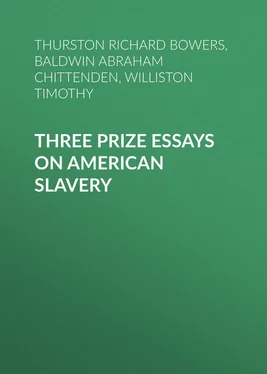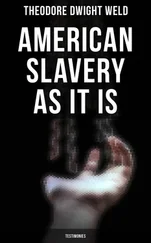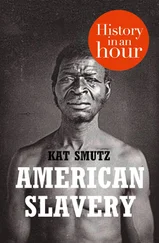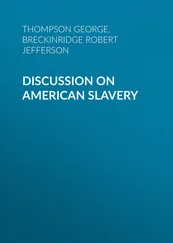Timothy Williston - Three Prize Essays on American Slavery
Здесь есть возможность читать онлайн «Timothy Williston - Three Prize Essays on American Slavery» — ознакомительный отрывок электронной книги совершенно бесплатно, а после прочтения отрывка купить полную версию. В некоторых случаях можно слушать аудио, скачать через торрент в формате fb2 и присутствует краткое содержание. ISBN: , Жанр: foreign_antique, foreign_prose, на английском языке. Описание произведения, (предисловие) а так же отзывы посетителей доступны на портале библиотеки ЛибКат.
- Название:Three Prize Essays on American Slavery
- Автор:
- Жанр:
- Год:неизвестен
- ISBN:http://www.gutenberg.org/ebooks/32422
- Рейтинг книги:5 / 5. Голосов: 1
-
Избранное:Добавить в избранное
- Отзывы:
-
Ваша оценка:
- 100
- 1
- 2
- 3
- 4
- 5
Three Prize Essays on American Slavery: краткое содержание, описание и аннотация
Предлагаем к чтению аннотацию, описание, краткое содержание или предисловие (зависит от того, что написал сам автор книги «Three Prize Essays on American Slavery»). Если вы не нашли необходимую информацию о книге — напишите в комментариях, мы постараемся отыскать её.
Three Prize Essays on American Slavery — читать онлайн ознакомительный отрывок
Ниже представлен текст книги, разбитый по страницам. Система сохранения места последней прочитанной страницы, позволяет с удобством читать онлайн бесплатно книгу «Three Prize Essays on American Slavery», без необходимости каждый раз заново искать на чём Вы остановились. Поставьте закладку, и сможете в любой момент перейти на страницу, на которой закончили чтение.
Интервал:
Закладка:
These discriminations answer certain ecclesiastical questions, which have occasioned much perplexity and discord. When properly applied, they take away whatever support a wicked institution has found by leaning upon the Church; at the same time they award to consistent Christians what is due to them by the religion of Jesus. If it shall be said, there will be practical difficulty in applying these discriminations, it is sufficient to answer, it will be less than the difficulty of disregarding them.
The question now arises, what can be done for the restriction and ultimate extinction of slavery as it is; for, since it is sinful, Christianity and patriotism declare it should be restrained and abolished.
First. The extension of slavery can and should be prevented by the Federal Government. The Scriptures have shown us, that the people in their sovereignty have not the right to create a slave State or a slave. Of course, the legislators and presidents; who receive in trust the power which emanates from the people, have no such right. If the Constitution assumed to confer this power, it would be the first national duly to amend that instrument in this particular. There is no power on earth competent to set aside either of the Creator's original institutions for man. But, according to the sound and established principle of strict construction, the Constitution as it is does not create slavery, or even acknowledge its existence, except by inference. Hence there is no legal objection to the measure which religion herself ordains. The religious and the political obligations of all citizens and all legislators coincide to protect, under the jurisdiction of Congress, the right of every man to be exempt from the condition of property, and to enjoy the property which he honestly earns. Thus the question concerning slavery and the territories is morally settled by divine authority; and to this no real objection can be made, except by that great interest, whose existence is inherently unrighteous and irreligious.
Secondly. In the slave States, legislation should restore to the enslaved population the primitive rights which God has given to all men, establishing for them, on humane and Christian principles, such relations as are suitable to their condition of poverty, ignorance, and dependence, and are adapted to secure at once their improvement and the general welfare.
This is the logical conclusion to be derived from the premises. As the central wrong of slavery consists in making men articles of property by law, the rectification is to lift from them by law the curse of the false and irreligious doctrine, that they can be rightfully held as property. Thus the axe is laid to the root of the tree.
This is also the conclusion to which we are forced by other moral principles bearing on the case. For men to receive services of men is right. Accordingly, the New Testament allows masters to receive services of those who are slaves in the sense of human law; but at the same time the sacred book requires masters, with all who employ labor, to make the recompenses which are just and equal towards men; for slavery is not right; and legislators, on their responsibility to the Ruler of nations, are bound to adjust the laws in harmony with the first principles of individual and moral obligation.
Furthermore, this is the only practical conclusion. By inevitable necessity, the slaves, as a body, must remain on the soil of their bondage. Only exceptional cases of removal can occur. They are the laborers of the South; and no State will, or can, or is bound, to remove its laborers. It is simply bound to protect and treat them with Christian equity and kindness. Banishment of them would be injustice and cruelty, violating perhaps no less than restoring divine rights. Moreover, no practicable means of removing them have ever been seriously proposed; and, till they shall be, the point needs no discussion.
But the question may be raised, "Are the slaves to endure their present wrongs until the laws shall be thus renewed, or perhaps forever?" We reply, in showing how slave-holders can cease from guilty connection with slavery; we have also shown how the situation of the slaves becomes one of practical righteousness, before the laws can be readjusted; and for this great obligation of the body politic, sufficient time most be allowed. Moral principles do not exact natural impossibilities. The elevation of oppressed millions can be accomplished only in harmony with great natural and social, as well as ethical laws, which the wisdom of God has ordained.
It remains therefore, that, for a period of which no man can see the end, the slaves must, in most cases, dwell within the present boundaries; but it is incumbent on the citizens and legislators of the South to institute immediate measures for restoring to them the inviolable rights of men. So long as they continue, by the necessities of the case, in the relation of servants and laborers, masters should deal with them according to the rules of humane and Christian equity, paying to them in suitable ways their just earnings, holding sacred their family ties, and securing to them the privileges of education and religion. Meanwhile, the legislatures of the several States, by wise enactments, should coöperate with masters in training their servile population for the position which the Creator designed for men.
When these things shall come to pass, a consideration, in which many good men have sought relief in regard to slavery, will have multiplied force. The providential wisdom of God, in bringing millions of the children of Africa from a land of pagan darkness and violence to a land of freedom and Christianity, will shine with new lustre, when they shall receive from American hands, together with true religion, every divine right, and shall thus be qualified and enabled to convey to the dark habitations of their fathers the infinite blessings of enlightened liberty and of the gospel of eternal salvation.
These things are practicable. So long as "righteousness exalteth a nation," a great, free, and Christian people can do what they should do; and thus only can they secure, under the divine blessing, their own highest prosperity and glory. To prove this would be simply to repeat the familiar facts which exhibit the legitimate effects of slavery on general intelligence, enterprise, and virtue.
But what shall produce the true and wide spread public sentiment, which is indispensable to usher in so radical a change in the laws and institutions of proud and powerful States? Truth must accomplish this great work – THE TRUTH that our Creator does not place those who bear his image in bondage to their fellow men as property, but invests them with a common and inviolable right of dominion over inferior things. The vivid light which this truth sheds on the social relations of men has been extinguished at the South; and it has been dimmed at the North. In every right way and in every place, therefore, it should be made to shine again unobscured. Expounders should bring it forth from the Holy Oracles; for Jehovah has hallowed it there, and made it equal in authority with the Sabbath. The press should publish it; for it is the function of the press to convey unceasingly to the public mind whatever will establish and crown the public integrity and welfare. All men should seal it in their hearts; for it is the divine rule and bond of brotherhood in the universal dominion. It surrounds them with protected families, and builds their safe firesides and their altars of worship.
Конец ознакомительного фрагмента.
Текст предоставлен ООО «ЛитРес».
Прочитайте эту книгу целиком, купив полную легальную версию на ЛитРес.
Читать дальшеИнтервал:
Закладка:
Похожие книги на «Three Prize Essays on American Slavery»
Представляем Вашему вниманию похожие книги на «Three Prize Essays on American Slavery» списком для выбора. Мы отобрали схожую по названию и смыслу литературу в надежде предоставить читателям больше вариантов отыскать новые, интересные, ещё непрочитанные произведения.
Обсуждение, отзывы о книге «Three Prize Essays on American Slavery» и просто собственные мнения читателей. Оставьте ваши комментарии, напишите, что Вы думаете о произведении, его смысле или главных героях. Укажите что конкретно понравилось, а что нет, и почему Вы так считаете.












